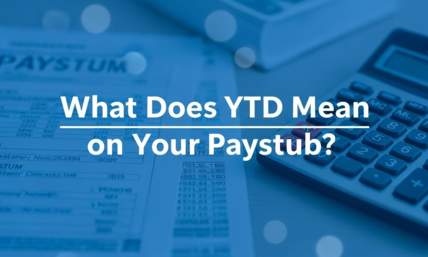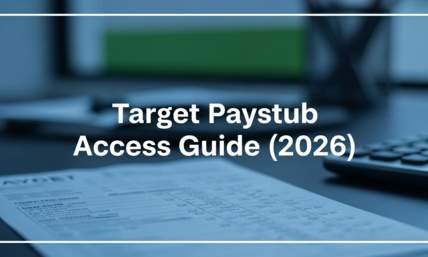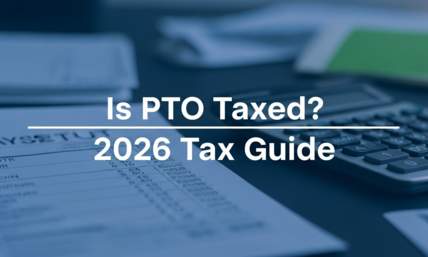Pay Stub Abbreviations and Acronyms: The Ultimate Guide
Can you read your paystub? What about the pay stub abbreviations? Most Americans find the pay stub abbreviations to be the hardest part! Most people expect a pay stub of some kind from their employers, even if it comes stuffed with pay stub abbreviations. While it's not mandatory under federal law, some states require them.
Employers these days almost always give them out as a basic courtesy and as a record-keeping tool for employees. Of course, getting a pay stub and understanding all of those paycheck stub abbreviations is not the same. In fact, most stubs contain a shocking number of pay stub abbreviations and acronyms. If you ever looked over your pay stub and wondered what it all meant, keep reading.
We'll give you the guide that covers the common and not-so-common pay stub abbreviations and codes.
What Is FICA
FICA is one of the more baffling pay stub abbreviations, especially for people that are new to the workforce. FICA stands for Federal Insurance Contributions Act. What makes it even more baffling is that it's usually broken down into two more areas: SS and Medicare. SS or something similar stands for social security.
Each social security contribution goes toward a national fund that assists senior citizens with living expenses. Medicare contributions help fund healthcare programs for senior citizens. These contributions come out of virtually every paycheck issued in the country. Of all the pay stub abbreviations you now know one of the most important.
Also read: What Should I Do If My Employer Won’t Provide A Pay Stub?
FSA or HSA
FSA or HSA are pay stub abbreviations for flexible spending or health saving accounts. In most cases, these are healthcare-related accounts. In essence, you withhold money from your paycheck to use against future healthcare costs. For example, you might use money in your FSA or HSA for a deductible, co-pay, or for medication costs.
These accounts don't usually act as straight-up insurance. Instead, people contribute as a way of defraying costs an insurance program doesn't cover.
Also read: Apartment Renters Call On Landlords To Accept Substitutes For Pay Stubs
IRA or 401(k)
An IRA is a specific form of retirement investing. It means an individual retirement account. For each check issued, you set aside a percentage of your pay and deposit it in the account. The company that manages the IRA then invests money from all the contributors in various stocks and securities. The idea is that the investments will increase in value over the long haul. Aren't you glad you learned these pay stub abbreviations?
By the time you retire, your personal investment should pay off enough that you can live comfortably. Some companies offer IRA programs that will come out of your check. However, you can set up your own IRA through a bank or credit union as well. A 401(k) operates in a similar fashion to an IRA.
The primary difference is that companies sponsor 401(k) plans and typically offer some kind of fund matching.
Self-employed individuals can set up their own 401(k). You typically can't set one up if you work for someone else.
Also read: What is The Importance Of Keeping Your Pay Stub?
SIT
The SIT pay stub abbreviation translates to state income tax. You typically see SIT pay stub abbreviations paired up with a state name acronym. For example, PA SIT means Pennsylvania state income tax. Not every state charges an income tax. In fact, there are nine states that don't tax earned income. If you work in one of these states for a local company, you probably won't see SIT in your pay stub abbreviations list.
You might see the acronym if you work for a national chain, but you shouldn't see any withholding for it.
MUNC
One of the possible pay stub abbreviations you might see on your paycheck stub is MUNC. This typically means municipal tax or city tax. Certain large cities, such as New York City, charge a local income tax for residents. These taxes come out of your paycheck just like federal or state taxes. Most areas don't charge a local income tax. Instead, they collect property taxes to fund local programs and local government.
Also read: Best Practices When Creating a Check Stub for a Self Employed Person
FIT
As complicated as these pay stub abbreviations sound, FIT simply stands for federal income tax. Your overall income helps determine the exact rate of your federal income tax. Federal taxes happen in tiers, with the lowest bracket paying a 10% tax rate and the highest earners paying a 37% tax rate. Knowing your tax bracket can help you check and see if your employer pays out enough in federal taxes.
Your federal withholding also depends on how many deductions you take. For example, someone with children might take an extra deduction. These deductions lower how much federal income tax you pay. You must remember how many deductions you asked for or it can look like your employer takes out the wrong amount.
Also read: How Can You Tell If Someone Is Using A Counterfeit Pay Stub
YTD
One of the paycheck stub abbreviations you might see is YTD, which means year to date. Employers track both your pay period amounts and how much you earn overall. This lets them issue accurate tax documents at the end of the year. Some employers also include it on employee paystubs. This lets you track your overall earnings over time.
If you earn a fixed salary, it can help you make sure you receive the appropriate amount over time. Some employers also include year-to-date information about your taxes paid and retirement contributions. These can also help you make sure the right amounts come out.
INS
You may see INS listed on your paystub. It's just a pay stub abbreviation for insurance. You typically only see this if your employer offers a healthcare plan. You may also see this even if you opt-out of your employer's insurance plan. If you do opt-out, the amount you paid should read as zero dollars.
The reason it shows up is that employers don't want to customize check printing based on your insurance status.
It's easier for them to print a zero next to the pay stub acronyms than leave the abbreviation off of some checks.
Making Sense Of Pay Stub Abbreviations
Making sense of pay stub abbreviations depends a lot on your career trajectory location. Early on in your working life, you'll likely only care about how much gets taken out in taxes. When you make more money later on in your career, those other pay stub abbreviations become more important. You worry about retirement or want lower federal withholdings because you had kids.
Then, you read the FIT or 401(k) information with more care. Now that you have decoded what these pay stub abbreviations stand for, you can read or even fill out your own paystub with confidence. Lastly, check out our online pay stub maker today!















